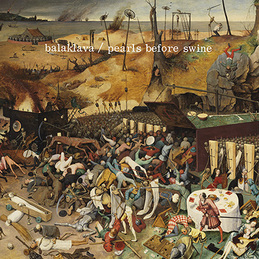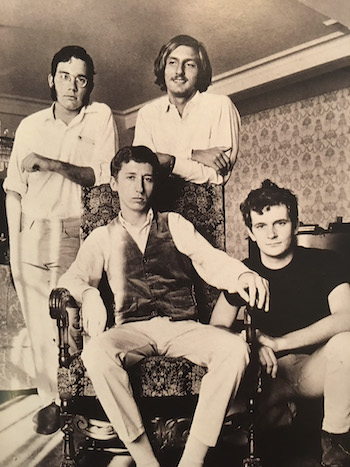 Pearls Before Swine – Balaklava
Pearls Before Swine – Balaklava
Drag City Records – 14 December 2018
The legendary, cultishly obscure band Pearls Before Swine was formed by maverick singer-songwriter Tom Rapp in the mid-1960s in Florida. Its debut album One Nation Underground (1967) was from the very moment of its appearance destined for obscurity almost by default, by virtue of it being released on the experimental jazz label ESP Disk, although to be fair its distinctly odd musical qualities alone also ensured that it would have remained under the curio category nevertheless. Towards the end of 2017, the Drag City label presented a persuasive case for that album’s reappraisal by according it a splendidly lavish 50th anniversary reissue (reviewed here), freshly remastered in mono from the master tapes by Richard Alderson, ESP house producer of the day, with much “forensic” assistance from Paul Mounsey and Joseph Miuccio.

The members of the band (Jim Bohannon, Wayne Harley and Lane Lederer) were augmented by New York jazz sessioners and the Fugs’ Lee Crabtree; a couple of key tracks sported string arrangements by either Selwart Clarke or Warren Smith, and the overall effect may have felt decidedly opaque, not exactly muddy but more in the sense of dreamlike. The latter quality is retained in this anniversary reissue, but at the same time the remaster has brought a subtle clarity to the instrumental parts, enhancing the support these provide for Rapp’s allegorical lyrics – thence reflecting the enigmatic combination of plain message and disturbingly piquant fine detail in the cover art, a detail from Bruegel The Elder’s The Triumph Of Death (incidentally drawing a telling parallel with the first-album appropriation of a portion of the Hell panel of Hieronymus Bosch’s visionary Garden Of Delights).
The album title derives from the opening track, which presents as the album’s prelude a verité Edison cylinder recording of the actual bugler who allegedly sounded and led the charge of the Light Brigade. Alderson’s own liner notes (available on his website) explain that “this addresses the nature of recording and its relation to physical representations of history and truth”.
The first song, Translucent Carriages, drifts into our consciousness on swishing, breathy washes of sound which beautifully portray the atmosphere of dawn with its ominous whispersome counterpoint of “love is silent at the edge of the universe, waiting to come in”. A mood which continues into the interrupted-idyllic promise of Images Of April, this time driven by an insistent bass guitar riff and bucolic fluttering flute. The anti-war stance comes prominently into focus on the next pair of songs, the slightly Cohen-esque parable There Was A Man and the desperate, wave-washed plea of I Saw The World, following which the desperation of love and transcendent infatuation are explored in the ornate chamber-folk minuet of Guardian Angels and a languid, somewhat phantasmal cover of Leonard Cohen’s Suzanne which features a quasi-improvisatory cor anglais obbligato from Joe Farrell. After this comes Lepers And Roses, at close on five-and-a-half minutes the album’s longest track, and the most difficult to assimilate in that it seems to ramble on and around a comparatively undistinguished melody line without really doing much to depict the lyric (and I’m fairly convinced that the “lepers” of the song’s title is a mondegreen-cum-mis-transposition of “leopard” that occurs in the lyric!). A snatch of another early acoustic recording, a mere 15 seconds of a speech by Florence Nightingale (the Crimea connection again, of course), introduces the LP’s penultimate track (and final song), Ring Thing, which is possibly the most interesting musically, with overtones of the ISB in its progressions, although unfortunately its lyrics aren’t ideally discernible (I say unfortunately because it’s the only song whose lyrics aren’t reproduced in the gatefold – I’m not sure whether this was also the case with the original sleeve). The album closes with some technical trickery: Rewind consists of the sound of a tape being audibly rewound followed by a coda reprising just a few seconds of the “trumpeter Landfrey” recording with which the LP began barely half an hour earlier. But whatever the album lacks in measurable playing-time it undoubtedly makes up for in terms of lyrical and textural inventiveness. By any standards, Balaklava remains an intriguing, if still slightly thorny, artefact that is both of and out of its fin-de-’68 temporal niche.
This necessarily now-definitive reissue of Balaklava (available on CD and vinyl) automatically supersedes any previous CD editions (all inferior in both sound and presentation), while it also serves as a natural memorial for Rapp himself, who passed away only last February while this new edition was being prepared for release.

